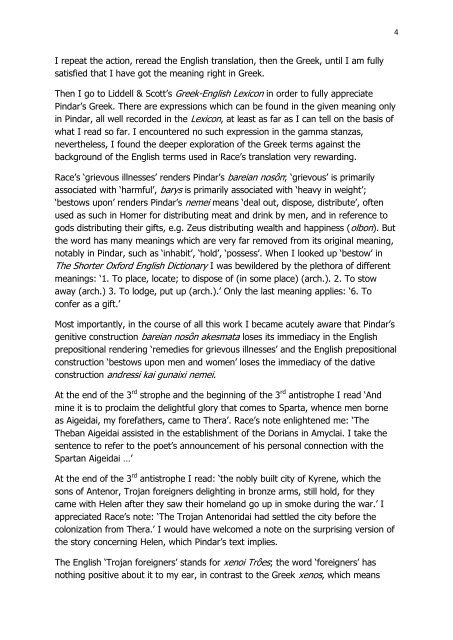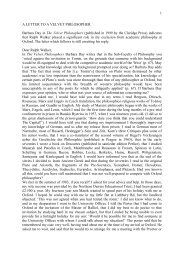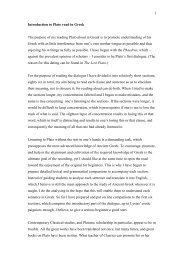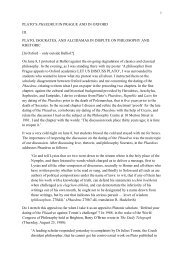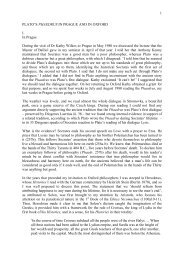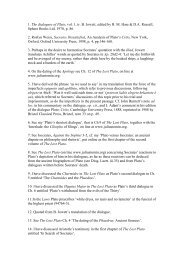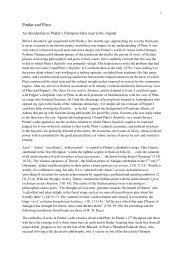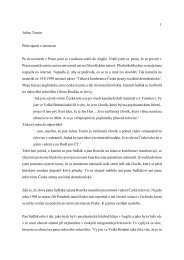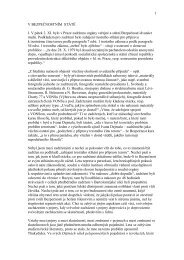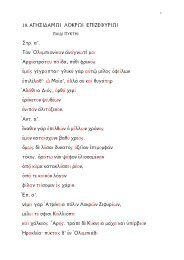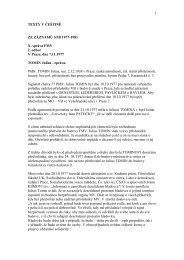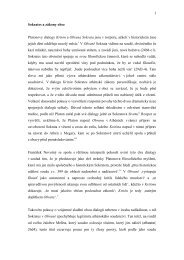ANOTHER PROTEST AT BALLIOL? I. Dear All, Allow ... - Julius Tomin
ANOTHER PROTEST AT BALLIOL? I. Dear All, Allow ... - Julius Tomin
ANOTHER PROTEST AT BALLIOL? I. Dear All, Allow ... - Julius Tomin
You also want an ePaper? Increase the reach of your titles
YUMPU automatically turns print PDFs into web optimized ePapers that Google loves.
4<br />
I repeat the action, reread the English translation, then the Greek, until I am fully<br />
satisfied that I have got the meaning right in Greek.<br />
Then I go to Liddell & Scott‟s Greek-English Lexicon in order to fully appreciate<br />
Pindar‟s Greek. There are expressions which can be found in the given meaning only<br />
in Pindar, all well recorded in the Lexicon, at least as far as I can tell on the basis of<br />
what I read so far. I encountered no such expression in the gamma stanzas,<br />
nevertheless, I found the deeper exploration of the Greek terms against the<br />
background of the English terms used in Race‟s translation very rewarding.<br />
Race‟s „grievous illnesses‟ renders Pindar‟s bareian nosôn; „grievous‟ is primarily<br />
associated with „harmful‟, barys is primarily associated with „heavy in weight‟;<br />
„bestows upon‟ renders Pindar‟s nemei means „deal out, dispose, distribute‟, often<br />
used as such in Homer for distributing meat and drink by men, and in reference to<br />
gods distributing their gifts, e.g. Zeus distributing wealth and happiness (olbon). But<br />
the word has many meanings which are very far removed from its original meaning,<br />
notably in Pindar, such as „inhabit‟, „hold‟, „possess‟. When I looked up „bestow‟ in<br />
The Shorter Oxford English Dictionary I was bewildered by the plethora of different<br />
meanings: „1. To place, locate; to dispose of (in some place) (arch.). 2. To stow<br />
away (arch.) 3. To lodge, put up (arch.).‟ Only the last meaning applies: „6. To<br />
confer as a gift.‟<br />
Most importantly, in the course of all this work I became acutely aware that Pindar‟s<br />
genitive construction bareian nosôn akesmata loses its immediacy in the English<br />
prepositional rendering „remedies for grievous illnesses‟ and the English prepositional<br />
construction „bestows upon men and women‟ loses the immediacy of the dative<br />
construction andressi kai gunaixi nemei.<br />
At the end of the 3 rd strophe and the beginning of the 3 rd antistrophe I read „And<br />
mine it is to proclaim the delightful glory that comes to Sparta, whence men borne<br />
as Aigeidai, my forefathers, came to Thera‟. Race‟s note enlightened me: „The<br />
Theban Aigeidai assisted in the establishment of the Dorians in Amyclai. I take the<br />
sentence to refer to the poet‟s announcement of his personal connection with the<br />
Spartan Aigeidai …‟<br />
At the end of the 3 rd antistrophe I read: „the nobly built city of Kyrene, which the<br />
sons of Antenor, Trojan foreigners delighting in bronze arms, still hold, for they<br />
came with Helen after they saw their homeland go up in smoke during the war.‟ I<br />
appreciated Race‟s note: „The Trojan Antenoridai had settled the city before the<br />
colonization from Thera.‟ I would have welcomed a note on the surprising version of<br />
the story concerning Helen, which Pindar‟s text implies.<br />
The English „Trojan foreigners‟ stands for xenoi Trôes; the word „foreigners‟ has<br />
nothing positive about it to my ear, in contrast to the Greek xenos, which means


